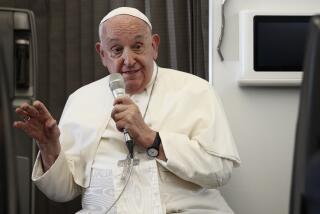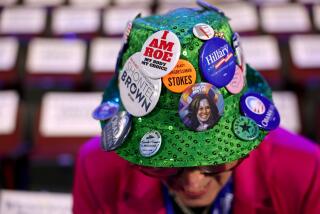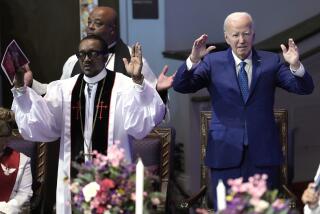Religion, politics dominate Easter Sunday talk shows
Airing on Easter and Passover, the Sunday morning news talk shows used the occasion to explore the religious questions and controversies that could emerge in the presidential election.
On “Face the Nation,” Catholic Archbishop Timothy Dolan said he hoped that if Mitt Romney were to become the Republican nominee for president, that his Mormon faith would not prove a liability.
“There may be reasons not to vote for Mitt Romney as president of the United States,” Dolan told host Bob Schieffer. “That he’s Mormon cannot be one of them.”
Dolan had harsher words for President Obama, who touched off a withering backlash from Catholic bishops, their supporters and the Republican Party when he moved earlier this year to require employers, including religious entities like Catholic hospitals and universities, to offer their workers contraceptive health benefits at no cost.
The administration later revised the rule to allow more religiously affiliated groups to opt out of the mandate than when it was first crafted. Further, employees at Catholic and other religious hospitals, charities and universities would have access to free birth control through their insurance companies.
Dolan criticized the compromise as inadequate, because many large Catholic institutions are self-insured and do not have an outside insurer that could fulfill the mandate. Characterizing the administration’s new rule as ‘strangling,’ Dolan went on to say: “You’ve got a dramatic, radical intrusion of a government bureaucracy into the internal life of the church.”
The administration and churches are still trying to fashion a compromise for self-insured institutions.
While a hot-button topic for the church, the contraceptive issue may have little effect on Obama, according to recent polls. A March poll by the Pew Forum on Religion and Public Life showed that 54% of Americans and 60% of Catholics specifically thought churches should refrain from getting involved in politics. Another poll showed that the majority of Catholics disagreed with their bishops that the contraceptive mandate was an attack on religious liberty.
Still, the level of religious groups’ involvement in politics led to a spirited debate later on “Face the Nation” on a panel that included, among others, Richard Land, president of the Southern Baptist Convention’s Ethics and Religious Liberty Commission; Luis Cortes Jr., president of Esperanza, a large Hispanic evangelical network; and Newsweek writer Andrew Sullivan, author of the magazine’s cover story “Christianity in Crisis.”
All agreed that there should be separation of church and state. Land said that separation came under threat when the state made decisions that affected religious belief, like legalizing abortion. As many conservative Christians have long insisted, Cortes and Land said secular forces are trying to silence religious, especially Christian, voices in public discourse.
Sullivan countered that religion and politics had grown too close. Conservative Christians constitute an enormously powerful political force. Their close cooperation with the Republican Party, Sullivan said, has made “many people feel that faith and Jesus is about politics and power and partisanship, in ways that’s turning off an entire generation.”
Cortes pointed out that Hispanic evangelicals, at least, might not hew so closely to the Republican Party, which has taken a strong, punitive stance against undocumented immigrants.
“We have folks, Hispanic people, who will probably not vote for the Republican leadership this year over the issue of immigration,” Cortes said. “If Romney gets 40% or 30% of the Hispanic evangelical vote, I’d be shocked, given what he’s been doing and what he’s been saying on the issue of immigration.”
Original source: Religion, politics dominate Easter Sunday talk shows
More to Read
Sign up for Essential California
The most important California stories and recommendations in your inbox every morning.
You may occasionally receive promotional content from the Los Angeles Times.











